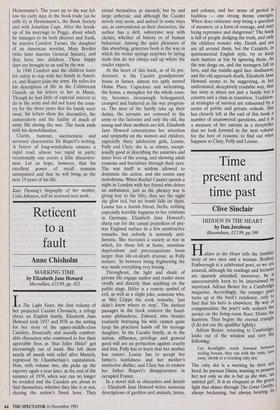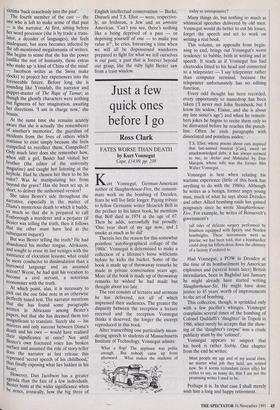Time present and time past
Clive Sinclair
HIDDEN IN THE HEART by Dan Jacobson Bloomsbury, £12.99, pp.199 Hidden in the Heart tells the familiar story of two men and a woman. Rodney Foxborough is a celebrated poet, so we are assured, although his readings and lectures are sparsely attended; moreover, he Is unaccountably keen to be interviewed by starstruck Adrian Bester for a Cambridge magazine. Accordingly, the younger poet turns up at the bard's residence, only to find that his hero is elsewhere. By way of compensation, the poet's wife seduces the novice on the living-room floor; Diana the huntress. Thus begins the eternal triangle (I do not use the qualifier lightly). Adrian Bester, returning to Cambridge, looks out of the window and sees the following: Car headlights reach forward between reeling houses, they run with the train, turn away, shrink to a receding ruby dot.
Theruby dot is a warning he does not heed; he pursues Diana, wanting to possess her not only as she is but as she was, 'an untried girl'. It is as eloquent as the green light that shines through The Great Gatsby, always beckoning, but always bearing its
victims 'back ceaselessly into the past'.
The fourth member of the cast — the one who is left to make sense of that past — is the narrator, At first, sitting before her word processor (she is by trade a trans- lator, a decoder of languages), she feels inadequate, but soon becomes infected by the oft-mentioned megalomania of writers. She begins to sense that she has the power (unlike the rest of humanity, those extras Who make up 'a kind of China of the mind' — Jacobson writes as the Swiss make clocks) to project her experiences into the foreseeable future. Before long she is sounding like Yonadab, the narrator and puppet-master of The Rape of Tamar; as though the ghostly characters were nothing but figments of her imagination, awaiting her directions. 'I am in charge now,' she boasts.
At the same time she remains acutely aware that she is actually 'the rememberer Of another's memories', the guardian of incidents from the lives of others which continue to exist simply because she feels compelled to recollect them. Compelled? Only much later does she remember how, When still a girl, Bester had visited her brother (the editor of the university magazine) and caught her listening at the keyhole. Had he chosen her then to be his voice? Was he manipulating her from beyond the grave? Has she been set up, in Short, to deliver the authorised version?
She takes Bester's side throughout the narrative, especially in the matter of Diana's mysterious death to which it builds; so much so that she is prepared to call Foxborough a murderer and a perjurer (if Hester was telling the truth, then it follows that the other must have lied at the subsequent inquest).
But was Bester telling the truth? He had abandoned his mother tongue, Afrikaans, and sought to erase its last vestiges with the assistance of elocution lessons; what could be more conducive to dissimulation than a borrowed language and an assumed accent? Worse, he had quit his vocation to become a civil servant, a notorious economiser with the truth.
At which point, alas, it is necessary to Pick out the one false note in an otherwise Perfectly tuned text. The narrator mentions that she has found some paragraphs written in Africaans among Bester's Papers, but that she has deemed them too Insignificant to translate. Surely she — his mistress and only succour between Diana's death and his own — would have realised their significance at once? Not until nester's own fractured voice has broken surface and assumed the role of story-teller does the narrator at last release this repressed 'secret speech of his childhood,' thus finally exposing what lies hidden in his heart.
However, Dan Jacobson has a greater agenda than the fate of a few individuals. Hester hints at the wider significance when be notes, ironically, how the big three of
English intellectual conservatism — Burke, Disraeli and T.S. Eliot — were, respective- ly, an Irishman, a Jew and an aniviste American. 'Can't you see, there's nothing like a being deprived of a past — or depriving yourself of one — to make you value it?', he cries, foreseeing a time when we will all be dispossessed wanderers prepared to fight for what we tell ourselves is our past; a past that is forever beyond our grasp, like the ruby light Bester saw from a train window.











































































 Previous page
Previous page